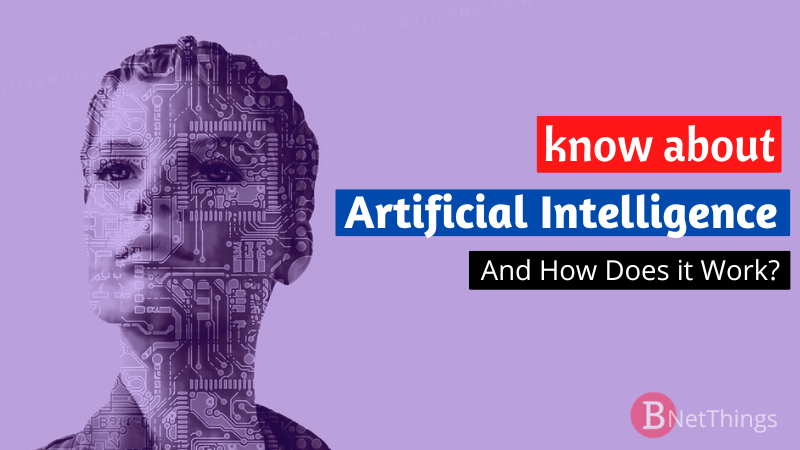Artificial Intelligence (AI) is a field of computer programming with the goal of making computers think more like humans. In other words, AI is a computer program designed to mimic human behaviour and solve problems like a human would.

Whether you’re new to the world of AI or have been keeping tabs on its progress, you may be wondering, What exactly is artificial intelligence, and how does it work? This article explains everything you need to know about artificial intelligence and how it works.
Keep reading to find out everything from what AI is, the benefits it can provide businesses, how we’re using AI today, and examples of AI in action.
What is Artificial Intelligence?
Artificial intelligence is the ability of a computer program to complete tasks that would otherwise require human intelligence. It is a computer system that is capable of things that would normally require human intelligence, such as decision-making, analysis, planning, and pattern recognition.
AI is the intelligence exhibited by machines (as opposed to human beings). This definition emphasizes the central idea that machines are trying to do what we do, not just be like us or be more useful in certain limited respects.
This is a narrower, more technical definition than that of the more general term “intelligent machines” or “artificial intelligence,” which is commonly used to refer to machines that can be helpful to human beings and which many people think should be a major goal of scientific and technological research.
How Does Artificial Intelligence Work?
Artificial Intelligence, in a nutshell, is the ability of a computer program to complete tasks that would otherwise require human intelligence.
For example, a computer program designed with AI could be programmed to read the text and identify the topics discussed in that text, as would a human reader.
AI can be broken down into three primary subfields: –
Machine Learning: ML is a type of AI that uses data to learn and grow as a human would. It’s a subfield of computer science that uses algorithms to learn new information without being programmed to do so. –
Natural Language Processing: NLP is a subfield of computer science that allows computers to gather, process, and understand human language. Computers that can understand human language are essential for almost any type of business, as they can gather information from written documents and spoken language.
Computer Vision: It is a subfield of computer science that allows computers to see and make sense of visual images. While not as common in commercial settings as natural language processing, computer vision has become increasingly important for artificial intelligence due to the rising popularity of machine vision.
Problems Artificial intelligence Can Solve
Artificial intelligence (AI) is often a catch-all term that refers to any machine with some level of intelligence. However, it is also used to describe computer programs designed to complete tasks that would otherwise require human intelligence.
Artificial intelligence can be used to solve many problems that would otherwise be difficult or impossible for computers to accomplish:
Guide humans: Some artificial intelligence programs are designed to guide humans. For example, many artificial intelligence programs are used to guide autonomous vehicles.
Make predictions: Computer programs can use data to make predictions about the future. In fact, many businesses use artificial intelligence to predict stock prices and customer purchasing.
Read the text and understand it: Computer programs can read text, whether that text is in the form of an article, manual, or conversation. They can take that information and understand it, which is something few humans can do.
Benefits of Artificial intelligence for Businesses
AI is a broad term that describes the abilities of a computer program to complete tasks that would otherwise require human intelligence. Artificial intelligence can provide many benefits to businesses, such as greater efficiency, lower costs, and higher productivity.
Businesses can use artificial intelligence in many ways, like:-
Visual data: Visual data is one of the most important assets for businesses that want to use artificial intelligence. Visual data includes images that are used for marketing or for identifying products or problems.
Visual databases: Visual databases are collections of images that can be used for many purposes, including recognizing and finding items.
Image recognition: Image recognition is the ability of a computer program to identify items in an image. This can be used to identify products in stock, identify pests in crops, or even identify fake products.
Image tagging: Image tagging is the process of attaching keywords to images. This can be used to identify the products in images or which products are in stock.
Document understanding: Document understanding is the ability of a computer program to understand the topic of written documents. This is helpful for businesses that want computers to understand contracts, instructions, or other documents.
Conversational analysis: Conversational analysis is the ability of a computer program to understand conversations. This can be used to gather information about customers or to gather information for marketing purposes.
Sentiment analysis: Sentiment analysis is the ability of a computer program to detect emotions from written documents. This can be used to understand how customers feel about certain products or services.
Language translation: Language translation is the ability of a computer program to translate written documents from one language to another. This is helpful for businesses that want to expand to different countries or want to provide service to people who don’t speak English.
Drawbacks of Artificial Intelligence for Businesses
While artificial intelligence can provide many benefits to businesses, it can also have negative consequences. Computers can make mistakes, and sometimes those mistakes can be costly.
Error rates: Every computer program will make mistakes, but some programs make more errors than others. Computer programs designed with artificial intelligence have error rates that are higher than programs without AI.
Ethics: When computers make mistakes, those mistakes can have serious consequences. Not only can computers create errors, but they can also make ethical mistakes. That’s because computers don’t understand ethics the same way humans do.
Lack of creativity: One of the drawbacks of artificial intelligence is that computers are designed to follow specific rules. While this is helpful in many situations, it can also be a drawback, as computers don’t have the creativity of humans.
Lack of empathy: Another drawback of artificial intelligence is that computers don’t have emotions or feelings. This can be helpful in some situations, but it can also be a problem when computers are used to gather data about people.
Examples of Artificial Intelligence in Everyday Life
Whether we realize it or not, AI is all around us and playing an active role in our daily lives. Every time we open our Facebook newsfeed, do a Google search, get a product recommendation from Amazon or book a trip online, AI is lurking in the background.
- AI in Social Media: Platforms like Facebook, Instagram, Twitter and Snapchat, all these social media is in a constant battle to personalize and cultivate worthwhile experiences for users with the help of Artificial intelligence.
- AI in E-commerce & Retail: Amazon, LivePerson, Flipkart, AliBaba these all are using artificial intelligence to predict purchases and gather data to create a more customer-centric shopping experience.
- AI in Travel & Transportation: From making travel arrangements to suggesting the most efficient route home after work, AI is making it easier to get around. Google Travel, OLA, Uber Go, RedBus and Hooper are some examples of how artificial intelligence is being used in the travel and transportation industries
Pros and Cons of AI
There are both pros and cons to AI. These include: –
Pros of Artificial intelligence: AI can make better decisions than human beings, can solve problems in creative ways, and can help businesses take advantage of new opportunities.
Cons of Artificial intelligence: AI systems are expensive to build and maintain, and they’re unregulated by the government so there are no laws to protect consumers from them.
Overall: AI has the potential to change the world. But it’s important to keep an eye on the cons so we can make sure AI is used for good.
Must Read: What is Software Engineering – An Introduction
Where to Learn More about AI?
If you want to learn more about artificial intelligence and how it works, you have plenty of sources to choose from. You can read books or journal articles written by experts, or you can even sign up for classes at university. Artificial intelligence is a fascinating field and one that is rapidly changing and developing.
As we learn more about how the human brain works and what makes it so powerful, we’re able to apply those lessons to the computers we build. As a result, artificial intelligence is something that is growing increasingly ubiquitous across a wide range of fields, from marketing and customer service to healthcare and transportation.
Conclusion
Artificial Intelligence is a computer programming discipline that develops computer systems able to perform human-like tasks. The term “artificial intelligence” was coined in 1956 when researchers from the Massachusetts Institute of Technology created a program that could solve a puzzle.
AI works by breaking down complex problems into smaller parts that can be solved one at a time. Once it figures out the best way to approach a problem, it can solve that problem again and again in the exact same way.
But AI can also learn new information as it goes. It can expand its knowledge over time to solve bigger, more complicated problems. Artificial intelligence has many benefits for daily life and businesses. Overall, AI has the potential to change the world if we use it wisely.






![[Top 10] Best ways to Earn Money Online 2023 popular ways to earn online money](https://bytizenotes.com/wp-content/uploads/2023/02/make-money-online-100x70.png)